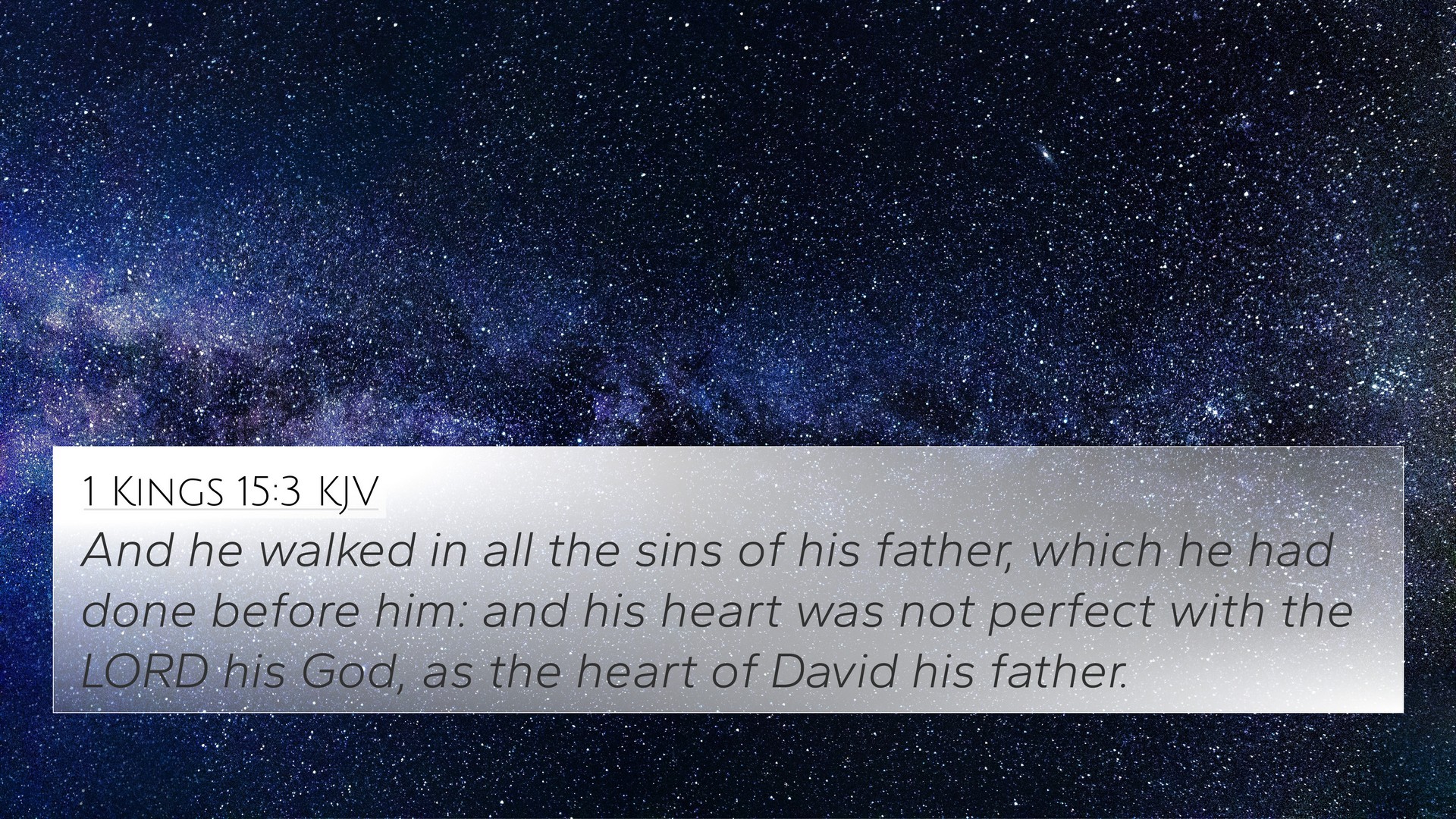Understanding 1 Kings 15:3
1 Kings 15:3: "And he walked in all the sins of his father, which he had done before him: and his heart was not perfect with the LORD his God, as the heart of David his father."
Summary of Meaning
This verse addresses the character and actions of King Abijam (or Abijah) of Judah, illuminating the spiritual state of his heart in relation to God, especially in contrast to his father, David. The passage highlights that while he continued the sinful practices established by his father, he lacked the true devotion and purity of heart that characterized David.
Insights from Public Domain Commentaries
Matthew Henry's Commentary:
-
Sinful Continuation: Henry emphasizes that Abijam's reign was marked by the same sins practiced by his father, reflecting a failure to break from the cycle of disobedience. This is indicative of a heart that does not align with the divine will.
-
Comparative Character: The commentary draws a key comparison to David’s heart—perfect and loyal to God—highlighting the disparity between Abijam’s actions and David's faithfulness.
Albert Barnes' Notes:
-
Heart Condition: Barnes lends insight into the importance of the state of the heart; Abijam’s heart was not “perfect” (whole) before God, conveying that external actions do not equate to true devotion.
-
Legacy of Sin: He comments on the generational patterns of sin, demonstrating how the sins of a father can affect the conduct of his children.
Adam Clarke’s Commentary:
-
Historical Context: Clarke provides historical context, detailing how Abijam’s reign was a continuation of the sins of previous kings, which demonstrates the political and spiritual decline in Israel and Judah.
-
Distinguishing Characteristics: Clarke notes the significance of “walking” in sins as a philosophical stance of living in opposition to God, pointing out the contrast with David, who “walked” with God.
Cross References for 1 Kings 15:3
In studying this verse, several other Bible verses come into play as they relate to the themes of sin, heart devotion, and generational legacies:
- 2 Samuel 11:4-5: King David's sin with Bathsheba demonstrates the impact of sin on families.
- 1 Kings 11:4: The divergence of Solomon's heart from that of David.
- Psalm 51:10: David's prayer for a clean heart, contrasting Abijam's unfaithfulness.
- Proverbs 4:23: The importance of guarding one's heart, reflecting on its role in one's actions.
- Jeremiah 17:9: The deceitfulness of the heart emphasizes the need for genuine dedication to God.
- 1 Corinthians 10:12: A warning of how overconfidence in one's spiritual state can lead to fall.
- Ezekiel 18:30: A call for the house of Israel to turn from their sins, a theme echoed in Abijam's story.
- Matthew 15:19: Jesus teaches about the heart's role in sinful actions, drawing a line to Abijam's behavior.
- Acts 13:22: God's view of David's heart as a marker of true kingship.
- Romans 6:12-13: Paul's exhortation not to let sin reign in our mortal bodies, crucial in understanding the need for righteous living.
Conclusion
1 Kings 15:3 serves as a significant reflection on the importance of the heart's condition in relation to God. Abijam's lack of fidelity to God sets a stark contrast to David's legacy, emphasizing the necessity of genuine commitment over mere external compliance. This scripture prompts believers to engage with the themes of sin, legacy, and the heartfelt relationship with the Divine, encouraging a deep understanding of scriptural cross-referencing and thematic connections throughout the Bible.










